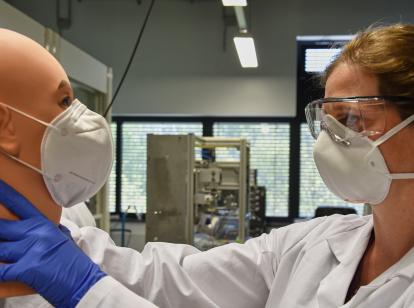Quality tests of FFP2 masks and filter materials made in Aachen
DWI, RWTH Aachen University and partners develop three-stage test procedure
Scientists at RWTH Aachen University and DWI - Leibniz Institute for Interactive Materials have developed a three-step test procedure for FFP2 masks and filter materials together with partners from the Aachen region. Besides the RWTH Chair of Chemical Process Engineering, the DWI - Leibniz Institute for Interactive Materials and the Institute for Occupational, Social and Environmental Medicine of the UKA were involved in this project. Support from industry is provided by the two spin-offs FURTHRresearch and ZUMOLab as well as the metrology company TSI. At the measuring stand in the Aachener Verfahrenstechnik (AVT), numerous masks have already been tested in recent weeks and most of them have been evaluated positively.
Corona crisis demands versatile support
"Since the beginning of the corona crisis, hospitals have been requiring significantly more FFP2 masks. Some of these they are purchasing from new suppliers. With our initiative, we want to contribute to the safe supply of medical personnel and have therefore developed the test procedure within a few days, which supports hospitals in their quality control," says Dr. John Linkhorst, senior engineer at the Chair of Chemical Process Engineering, describing the motivation. He adds: "Initially, our measurement campaign was limited to a cooperation with the UKA. In the meantime, we are supporting hospitals throughout Germany, as well as other institutions such as fire departments and emergency services".
Three-step process enables holistic quality assessment
The process is based on the corresponding DIN standards. At the insitute of biochemical engineering, testing takes place in three stages: First, the fit of the mask on a doll's head is assessed. A good fit ensures that no viruses can get past the mask and into the airways. Then measurements in a mask holder show the filtration performance. In this way the masks are tested as a whole, including workmanship. Finally, the employees check the properties of the actual filter material to identify potential sources of error. "If high-quality filter material is processed into a well-fitting mask without defects, we can clearly see this in the results. We inform the hospitals immediately about the measurement results and on this basis they can decide on the further use of the masks," says environmental engineer Anna Kalde, who works at DWI and is doing her doctorate at RWTH. She organizes the mask tests together with Dr.-Ing. John Linkhorst and Michael Alders.
Reliable results through excellent cooperation
Prof. Dr.-Ing. Matthias Wessling, holder of the Chair of Chemical Process Engineering and member of the scientific directorship of the DWI explains: "From basic research in the field of filter materials, 3D printing, the construction of prototypes and pilot plants to applied medical technology, we cover a broad field of research at AVT. That's why we are used to interdisciplinary cooperation and speaking a common language across different research fields with various industrial partners. Our dedicated team brings these competences to the project in a very profitable way". M. Wessling is, in addition to the functions described above, Vice Rector for Research and Structure at RWTH Aachen University and has been the recipient of the prestigious Gottfried Wilhelm Leibniz Prize since 2019. "We are still receiving many inquiries, we will continue testing", says Wessling.
The support of the industrial partners from the region has contributed significantly to the success of the project. TSI GmbH provides an aerosol generator and detector for the measuring stand, ZUMOLab enables the storage of data by providing control software and a measuring box, and FURTHRresearch accompanies the tests with know-how from process technology combined with individual data management software.

